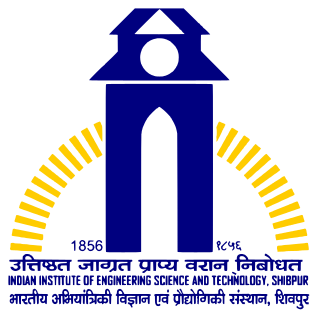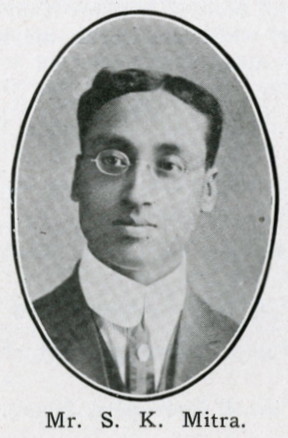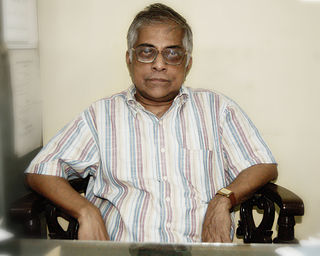
The University of Calcutta is a public state university located in Kolkata, West Bengal, India. It has 151 affiliated undergraduate colleges and 16 institutes in Kolkata and nearby areas. It was established on 24 January 1857 and is the oldest multidisciplinary university of Indian Subcontinent and South East Asian Region. Today, the university's jurisdiction is limited to a few districts of West Bengal, but at the time of its establishment it had a catchment area ranging from Kabul to Myanmar. Within India, it is recognized as a "Five-Star University" and accredited an "A" grade by the National Assessment and Accreditation Council (NAAC).

The West Bengal National University of Juridical Sciences is a National Law University (NLU) located in Bidhannagar, Kolkata, West Bengal, India. In 2023, it was ranked 4th among law colleges in India by National Institutional Ranking Framework and 2nd by India Today. It comes under the exclusive chancellorship and purview of the Chief Justice of India.

Indian Institute of Engineering Science and Technology, Shibpur, abbreviated as IIEST Shibpur is a public technological university located at Shibpur, Howrah, West Bengal, India. Founded in 1856, it is recognised as an Institute of National Importance under MHRD by the Government of India. It is controlled by the Council of NITSER. It is the fourth oldest engineering institute in India after College of Engineering, Guindy, IIT Roorkee, College of Engineering, Pune.

Sisir Kumar Mitra MBE, FNI, FASB, FIAS, FRS was an Indian physicist.

Institute for Advanced Studies in Basic Sciences (IASBS) also known as Zanjan Graduate University of Basic Sciences is a public advanced research center and university in Zanjan, Iran founded in 1991 by Prof. Yousef Sobouti. The goal of establishing IASBS was to provide a leading research-based institute in advanced science topics for both researchers and students in Iran.
Education in West Bengal is provided by both the public sector as well as the private sector. The modern education system was developed by the British missionaries and the Indian social reformists. West Bengal has many institutes of higher education like –Indian Institute of Technology Kharagpur, Marine Engineering and Research Institute, Jadavpur University, Indian Institute of Management Calcutta, Indian Institute of Engineering Science and Technology, Shibpur, Indian Institute of Science Education and Research, Kolkata, National Institute of Technology, Durgapur, Indian Institute of Information Technology, Kalyani, Indian Statistical Institute, West Bengal University of Health Sciences, University of North Bengal and University of Calcutta.

Bangabasi Morning College is an undergraduate college affiliated with the University of Calcutta. It is located at Sealdah in the heart of the city of Kolkata. It has a very large auditorium named as P.K. Bose Memorial Hall.

The Maulana Abul Kalam Azad Institute of Asian Studies is an autonomous research institute based in Kolkata. It is funded by the Ministry of Culture of the Government of India. It was founded on 4 January 1993. The foundation stone of the institute was laid where the new building now stands on 12 March 1993. It is devoted to the study of the life and works of Maulana Abul Kalam Azad, the eminent nationalist leader and India's first education minister, after whom it is named, and to the furtherance of Area Studies, with special reference to South Asia, Central Asia and West Asia, especially dealing with social, cultural, economic, political and administrative developments in Asia from the nineteenth century to the present. M.Phil.- and Ph.D.-level students of the University of Calcutta, Jadavpur University and Jawaharlal Nehru University, New Delhi are also associated with it.
Majumdar is a native Bengali surname that is used by both the Bengali Hindu and Bengali Muslim community of Indian states of West Bengal, Assam and as well as of Bangladesh.

The Institute of Development Studies Kolkata (IDSK) is an autonomous research institute dedicated for development studies and related subfields in Bidhannagar, West Bengal, India. Established in 2002 as a centre of excellence in social sciences, the institute is funded by the Government of West Bengal and recognised by the Indian Council of Social Science Research (ICSSR).

Jayanta Kumar Ghosh was an Indian statistician, an emeritus professor at Indian Statistical Institute and a professor of statistics at Purdue University.

Centre for Excellence in Basic Sciences is an autonomous institute with an affiliation to the University of Mumbai. It was set up in the University of Mumbai by the Department of Atomic Energy (DAE) in collaboration with the university. This institute offers undergraduate science education and research opportunities. It aims at improving the quality of basic science education in the country at the undergraduate level and developing a pool of scientists for the various scientific works of the country. The Institute was inaugurated on 17 September 2007 by Dr R. Chidambaram, Principal Scientific Advisor to the Government of India. In 2016, the institution was granted the status of "Aided Institution" under the Department of Atomic Energy by the Government of India.

Dipan Ghosh is an Indian theoretical physicist, best known for his exact enumeration of the ground state of a Heisenberg antiferromagnet, known in literature as the Majumdar–Ghosh model, which he developed with Chanchal Kumar Majumdar.

Amitava Raychaudhuri is an Indian theoretical particle physicist. He is Professor Emeritus at the Physics Department of the Science College, University of Calcutta where he earlier held the Sir Tarak Nath Palit Chair Professorship. He is the nephew of another renowned Indian physicist, Amal Kumar Raychaudhuri.

Sir Jnan Chandra Ghosh or Jnanendra Chandra Ghosh was an Indian chemist best known for his contribution to the development of scientific research, industrial development and technology education in India. He served as the director of the newly formed Eastern Higher Technical Institute in 1950, which was renamed as IIT Kharagpur in 1951. He was also the director of the Indian Institute of Science Bangalore and Vice Chancellor of the University of Calcutta.
Rabindranath Mukherjee also known as R N Mukherjee is an Indian former chemistry professor who is an elected fellow of the Indian National Science Academy. He was former Director of Indian Institute of Science Education and Research, Kolkata
Ramesh Chandra Majumdar (1904-1995) was an Indian physicist who made contributions in several branches of theoretical physics, notably statistical mechanics and ionospheric physics. He played a key role in setting up the Department of Physics and Astrophysics at the University of Delhi, which he headed for around nine years, and also was pro-vice-chancellor of the university. He was elected a Fellow of the Indian National Science Academy and was general secretary of the National Academy of Sciences, India.

Chanchal Kumar Majumdar was an Indian condensed matter physicist and the founder director of S.N. Bose National Centre for Basic Sciences. Known for his research in quantum mechanics, Majumdar was an elected fellow of all the three major Indian science academies – the Indian National Science Academy, the National Academy of Sciences, India, and the Indian Academy of Sciences – as well a member of the New York Academy of Sciences and the American Physical Society.
Arup Kumar Raychaudhuri is an Indian condensed matter physicist, materials scientist and a Distinguished Emeritus Professor at the S. N. Bose National Centre for Basic Sciences. Known for his pioneering work on the interplay of disorder and interaction, Raychaudhuri is an elected fellow of all the three major Indian science academies viz. Indian Academy of Sciences, National Academy of Sciences, India and Indian National Science Academy as well as the Asia-Pacific Academy of Materials. He is a recipient of a number of awards such as Millennium Medal of the Indian Science Congress, ICS Gold Medal of the Materials Research Society of India and FICCI Award. The Council of Scientific and Industrial Research, the apex agency of the Government of India for scientific research, awarded him the Shanti Swarup Bhatnagar Prize for Science and Technology, one of the highest Indian science awards, for his contributions to physical sciences in 1994.

The University College of Science, Technology and Agriculture are two of five main campuses of the University of Calcutta (CU). The college served as the cradle of Indian Sciences by winning the Nobel Prize in Physics in 1930 and many fellowships of the Royal Society London.

















